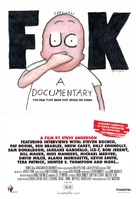Reviews provided by RottenTomatoes
Moira MacDonald, Seattle Times: But F*** gives short shrift to a question that many moviegoers may well ponder: How, exactly, has this word become a substitute for wit, or, in many movies, for dialogue? Read more
Michael Phillips, Chicago Tribune: The film works best when widening its focus to include the Federal Communications Commission's often baffling and hypocritical stances regarding what's OK to say, or show, on TV and radio, and what isn't. Read more
Jonathan Rosenbaum, Chicago Reader: If you're wondering how Steve Anderson managed to make a 93-minute documentary about the ultimate four-letter word, which uses the epithet over 800 times, you're underestimating his capacity to entertain and educate in roughly equal doses. Read more
Mick LaSalle, San Francisco Chronicle: Tried and true bad arguments are advanced. Read more
Noel Murray, AV Club: The movie doesn't add much to the culture wars, beyond histrionics from a lot of people who take their causes too f***ing seriously. Read more
Christy Lemire, Arizona Republic: F--- branches out into a discussion of decency, ranging from David Caruso's bare butt on "NYPD Blue" to Janet Jackson's Super Bowl wardrobe malfunction. At this point, the movie has lost its initial focus. Read more
Wesley Morris, Boston Globe: Anderson's glib approach is to the movie's advantage, allowing anything profound to seem unexpected. Read more
Carina Chocano, Los Angeles Times: As funny and cathartic as the word it celebrates, and nearly as perversely shock-happy. Read more
Lisa Schwarzbaum, Entertainment Weekly: Everyone uses the four-letter word, not many publications (including EW) print it: That's one marketing hook for this goofily overproduced, frivolous documentary. Read more
John Patterson, L.A. Weekly: Profound and joyously silly at the same time, Steve Anderson's documentary about our most potent secular blasphemy comes at the word and subject from every conceivable angle: Its awesome power to offend the listener and to empower its utterer. Read more
Stephen Whitty, Newark Star-Ledger: By the end, it's espousing a point of view so lazily, reflexively liberal (and demonstrably addle-pated) you'd almost think the whole thing had been secretly directed by the right wing just to embarrass the left. Read more
Jack Mathews, New York Daily News: 90 minutes is too much time to devote to a four-letter word, even one with as many diverse uses and conjugations as this one. Read more
Andrew O'Hehir, Salon.com: It's going to be an entertaining and successful big-city date movie, let's say that. But it's essentially a mishmash of random ingredients, not very systematically presented and skewed to flatter its audience's presumed enlightenment. Read more
Colin Covert, Minneapolis Star Tribune: On the whole Anderson's film feels a decade or two behind the culture's cutting edge. Read more
Bill Stamets, Chicago Sun-Times: Far smarter fun with filth, though, can be found in The Aristocrats. Read more
Jennie Punter, Globe and Mail: But in the end, F*CK is at most a compendium of opinions and examples, and never feels like a story. Read more
Geoff Pevere, Toronto Star: If anything, the most vivid impression created by the movie is how much fun the word's use can potentially be and how its power is inevitably emboldened in direct proportion to the forces of decency lined up against it. Read more
David Jenkins, Time Out: The insight-neutral scrag ends of what feels like ten decent documentaries on censorship, semantics, social policy and broadcasting coalesce in this painfully self-satisfied and poorly made 'shock-doc'. Read more
Rob Nelson, Village Voice: Twelve-year-olds might get a charge out of this purportedly daring documentary celebration of the F-word, although it never occurs to filmmaker Steve Anderson that it might be fun or even genuinely lewd to interview kids on the subject. Read more
Stephen Hunter, Washington Post: ... It's a mere 90-some minutes long; it only feels like seven hours. Read more

